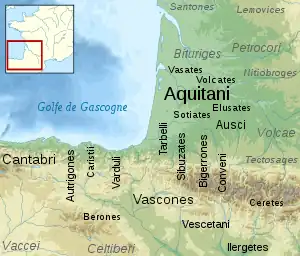
The Auscii or Ausci were an Aquitani tribe dwelling around present-day Auch during the Iron Age.
Alongside the Tarbelli, they were one of the most powerful peoples of Aquitania.[1]
Name
They are mentioned as Ausci by Caesar (mid-1st c. BC), Pliny (1st c. AD) and Pomponius Mela (mid-1st c. AD),[2][3][4] and as Au̓skíois (Αὐσκίοις) by Strabo (early 1st c. AD).[5][6]
The ethnonym Auscii may be related to the prefix eusk-, meaning 'Basque' in the Basque language (euskara).[7]
The city of Auch, attested as civitas Auscius in the early 4th century AD, is named after the tribe.[8]
Geography
Their territory was located north of the Onobrisates, west of the Cambolectri and Volcae Tectosages, south of the Lactorates, west of the Atures.[9]
The chief town of the Auscii was known as Elimberrum (modern Auch), whose name can be compared to the Basque ili-berri ('new town').[10]
Culture
It is believed that the Auscii spoke a form or dialect of the Aquitanian language, a precursor of the Basque language.[11]
See also
References
- ↑ Duval 1989, p. 739.
- ↑ Caesar. Commentarii de Bello Gallico, 3:27:1.
- ↑ Pliny. Naturalis Historia, 4:108.
- ↑ Pomponius Mela. De situ orbis, 3:2:20.
- ↑ Strabo. Geōgraphiká, 4:2:2.
- ↑ Falileyev 2010, s.v. Auscii.
- ↑ Allières, Jacques (1977). Les Basques. Presses Universitaires de France. p. 15.
- ↑ Nègre 1990, p. 1202.
- ↑ Talbert 2000, Map 25: Hispania Tarraconensis.
- ↑ Rostaing, Charles (1948). Les noms de lieux. Presses Universitaires de France. p. 34.
- ↑ Jacques Lemoine, Toponymie du Pays Basque Français et des Pays de l'Adour, Picard 1977, ISBN 2-7084-0003-7
Bibliography
- Duval, Paul-Marie (1989). "Les peuples de l'Aquitaine d'après la liste de Pline". Travaux sur la Gaule (1946-1986). Vol. 116. École Française de Rome. pp. 721–737. ISBN 9782728301676.
- Falileyev, Alexander (2010). Dictionary of Continental Celtic Place-names: A Celtic Companion to the Barrington Atlas of the Greek and Roman World. CMCS. ISBN 978-0955718236.
- Nègre, Ernest (1990). Toponymie générale de la France. Librairie Droz. ISBN 978-2-600-02883-7.
- Talbert, Richard J. A. (2000). Barrington Atlas of the Greek and Roman World. Princeton University Press. ISBN 978-0691031699.